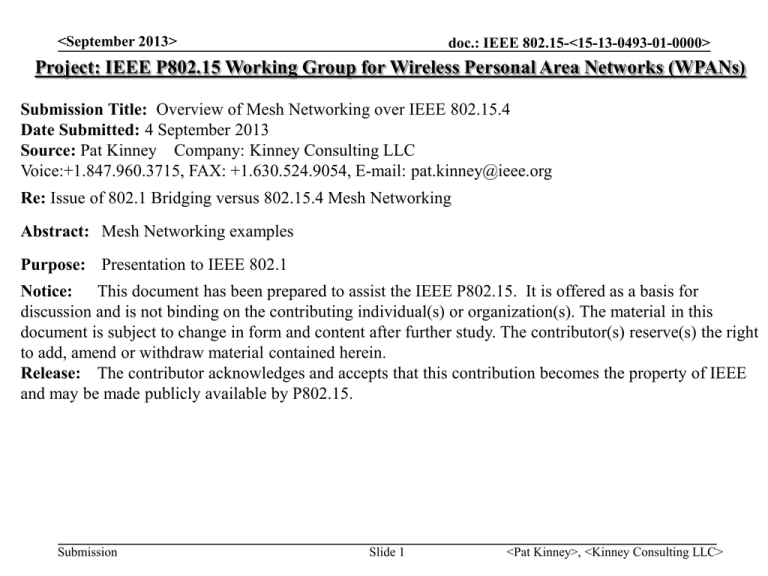Overview of Mesh Networking over IEEE 802.15.4
advertisement

<September 2013> doc.: IEEE 802.15-<15-13-0493-01-0000> Project: IEEE P802.15 Working Group for Wireless Personal Area Networks (WPANs) Submission Title: Overview of Mesh Networking over IEEE 802.15.4 Date Submitted: 4 September 2013 Source: Pat Kinney Company: Kinney Consulting LLC Voice:+1.847.960.3715, FAX: +1.630.524.9054, E-mail: pat.kinney@ieee.org Re: Issue of 802.1 Bridging versus 802.15.4 Mesh Networking Abstract: Mesh Networking examples Purpose: Presentation to IEEE 802.1 Notice: This document has been prepared to assist the IEEE P802.15. It is offered as a basis for discussion and is not binding on the contributing individual(s) or organization(s). The material in this document is subject to change in form and content after further study. The contributor(s) reserve(s) the right to add, amend or withdraw material contained herein. Release: The contributor acknowledges and accepts that this contribution becomes the property of IEEE and may be made publicly available by P802.15. Submission Slide 1 <Pat Kinney>, <Kinney Consulting LLC> <September 2013> doc.: IEEE 802.15-<15-13-0493-01-0000> Mesh Networking – at 802.15.4’s DLL 802.15.4 Overview Mesh Standards • 802.15.5 • IETF RPL • Proprietary Implemented Mesh Networks • Industrial • IEC 62591(Wireless HART) • IEC 62601 (WIA-PA) • IEC 62734 (ISA100.11a) • Smart Utility Networks • ZigBee Mesh Conclusion Submission Slide 2 <Pat Kinney>, <Kinney Consulting LLC> <September 2013> doc.: IEEE 802.15-<15-13-0493-01-0000> IEEE 802.15.4 Overview How significant is 802.15.4? • ~5 million 802.15.4 RFICs per month – ~2 million for consumer devices such as gaming, remote control, cable boxes, third party applications such as Xfinity – ZigBee Alliance uses such as smart meters, building automation, retail, et al – Lower volume uses in commercial and industrial applications such as industrial automation • Volumes are now increasing in an exponential fashion due to the installed bases including smart meters Submission Slide 3 <Pat Kinney>, <Kinney Consulting LLC> <September 2013> doc.: IEEE 802.15-<15-13-0493-01-0000> IEEE 802.15.4 Overview Historical Perspective • Initial publication was 2003, revision in 2006 and 2011 – Next revision is anticipated in 2014 • First uses of IEEE 802.15.4 RFICs beyond ZigBee were often not compliant with standard, e.g. using chips for bits • First trend in RFIC industry was to buy MAC firmware companies and then include the MAC with their RFIC Submission Slide 4 <Pat Kinney>, <Kinney Consulting LLC> <September 2013> doc.: IEEE 802.15-<15-13-0493-01-0000> IEEE 802.15.4 Overview • 802.15.4 WPAN: a simple, low-cost communication network that allows wireless connectivity in applications with limited power and relaxed throughput requirements. The main objectives of the 802.15.4 WPAN are ease of installation, reliable data transfer, extremely low cost, and a reasonable battery life, while maintaining a simple and flexible protocol. • Addressing: All devices operating on an 802.15.4 WPAN have unique 64-bit MAC addresses, referred to as extended addresses. A device will use either the extended address for direct communication within the WPAN or the 16-bit short address that was allocated by the WPAN coordinator when the device associated Submission Slide 5 <Pat Kinney>, <Kinney Consulting LLC> <September 2013> doc.: IEEE 802.15-<15-13-0493-01-0000> IEEE 802.15.4 Overview • MAC frame size: – typically <127 octets – Typical PHY data rates of 20kb/s to 250 kb/s yielding typical packet durations of 4 ms to 51 ms – Coherence time is the time duration over which the channel impulse response is considered to be not varying. Such channel variation is much more significant in wireless communications due to Doppler and multipath. Typical coherence times run from 2 – 25 ms • Network Components: 1) full-function device (FFD) and 2) reduced-function device (RFD). An FFD is a device that is capable of serving as the WPAN coordinator or a coordinator. An RFD is a device that is not capable of serving as either a PAN coordinator or a coordinator. An RFD is intended for applications that are extremely simple, such as a light switch or a passive infrared sensor; it does not have the need to send large amounts of data and only associates with a single FFD at a time. Consequently, the RFD can be implemented using minimal resources and memory capacity. Submission Slide 6 <Pat Kinney>, <Kinney Consulting LLC> <September 2013> doc.: IEEE 802.15-<15-13-0493-01-0000> IEEE 802.15.4 Overview • Network types: beacon-enabled, non beacon-enabled • Beacon-enabled • Non beacon-enabled • Each device communicates directly with other devices in its radio communications range. In order to do this effectively, the devices wishing to communicate will need to either receive constantly or synchronize with each other. In the former case, the device can simply transmit its data. In the latter case, other measures need to be taken in order to achieve synchronization. Such measures are beyond the scope of this standard. Submission Slide 7 <Pat Kinney>, <Kinney Consulting LLC> <September 2013> doc.: IEEE 802.15-<15-13-0493-01-0000> IEEE 802.15.4 Overview • Topologies: star, or peer-peer Submission Slide 8 <Pat Kinney>, <Kinney Consulting LLC> <September 2013> doc.: IEEE 802.15-<15-13-0493-01-0000> IEEE 802.15.4 Overview: Cluster Tree as one form of a mesh Submission Slide 9 <Pat Kinney>, <Kinney Consulting LLC> <September 2013> doc.: IEEE 802.15-<15-13-0493-01-0000> Mesh Standards • Presentation focus in on mesh-under, not over • Current mesh-under implementations run above MAC but below network layer – This is done due to lack of mesh mechanisms in 802.15.4 standard Submission Slide 10 <Pat Kinney>, <Kinney Consulting LLC> <September 2013> doc.: IEEE 802.15-<15-13-0493-01-0000> Mesh Standards: IEEE 802.15.5 Overview • This recommended practice provides a standard way of doing mesh networking over IEEE Std 802.15.4-2006 within the IEEE standard body • Supported features for LR-WPAN include the following: – – – – unicast, multicast, and reliable broadcast mesh data forwarding synchronous and asynchronous power saving for mesh devices trace route function portability of end devices Submission Slide 11 <Pat Kinney>, <Kinney Consulting LLC> <September 2013> doc.: IEEE 802.15-<15-13-0493-01-0000> Mesh Standards: IEEE 802.15.5 Overview Submission Slide 12 <Pat Kinney>, <Kinney Consulting LLC> <September 2013> doc.: IEEE 802.15-<15-13-0493-01-0000> Mesh Standards: IEEE 802.15.5 Overview Submission Slide 13 <Pat Kinney>, <Kinney Consulting LLC> <September 2013> doc.: IEEE 802.15-<15-13-0493-01-0000> Mesh Standards: IEEE 802.15.5 Overview • The hello command is used to exchange connectivity information among neighbors and to manage network and multicast group membership. Submission Slide 14 <Pat Kinney>, <Kinney Consulting LLC> <September 2013> doc.: IEEE 802.15-<15-13-0493-01-0000> Mesh Standards: IETF RPL Overview • RPL: distance vector IPv6 Routing Protocol for a Low power and Lossy Network – RPL: RFC 6553 – LLN: RFC 6550 • RPL constructs a Directed Acyclic Graph (DAG) that attempts to minimize path costs Submission Slide 15 <Pat Kinney>, <Kinney Consulting LLC> <September 2013> doc.: IEEE 802.15-<15-13-0493-01-0000> Mesh Standards: IETF RPL Overview • RPL defines an IPv6 option, called the RPL Option, to be carried within the IPv6 Hop-by-Hop header – only for use between RPL routers participating in the same RPL Instance – provides a mechanism to include routing information with each datagram that a router forwards – This document also specifies the use of IPv6-in-IPv6 tunneling [RFC2473] when attaching a RPL option to a packet. Submission Slide 16 <Pat Kinney>, <Kinney Consulting LLC> <September 2013> doc.: IEEE 802.15-<15-13-0493-01-0000> Mesh Standards: Proprietary • Large number of companies that use IEEE 802.15.4 have developed and use their own mesh network • Such as smart meter companies – e.g. Silver Spring Networks • Some companies offer mesh networks for inclusion in products – e.g. Synapse • Current trend is for RFIC companies buying mesh network companies reminiscent of the initial trend of buying MAC companies • ARM purchased Sensinode • Silicon Labs purchased Ember • Linear Technology purchased Dust Networks Submission Slide 17 <Pat Kinney>, <Kinney Consulting LLC> <September 2013> doc.: IEEE 802.15-<15-13-0493-01-0000> Industrial Mesh Network Overview • Industrial applications (and some commercial applications) have critical requirements such as low latency, robustness in the harsh industrial RF environment, and determinism that are not adequately addressed by IEEE Std 802.15.4-2006 • MAC behaviors added to IEEE 802.15.4 by the IEEE 802.15.4e amendment facilitate industrial applications such as addressed by IEC 62591 (WirelessHART), IEC 62734 (ISA100.11a), and IEC 62601 (WIA-PA), behaviors include: – TSCH - Time Scheduled Channel Hopping – DSME - Deterministic and synchronous multi-channel extension – IE - Information Elements for such items as TSCH Synchronization payload IE, TSCH-Slotframe and Link payload IE,TSCH Timeslot payload IE, and Channel Hopping payload IE – Secure Acknowledgment Submission Slide 18 <Pat Kinney>, <Kinney Consulting LLC> <September 2013> doc.: IEEE 802.15-<15-13-0493-01-0000> Industrial Mesh Network Overview • TSCH Operation – – – – All devices in the same network synchronize slotframes All timeslots are contained within a slotframe cycle Timeslots repeat in time: the slotframe period Device-to-device communication within a timeslot includes packet Tx/Rx & ACK Tx/Rx – Each timeslot uses a different channel, i.e. channel hopping • Industrial Systems typically include a network manager and a system manager Submission Slide 19 <Pat Kinney>, <Kinney Consulting LLC> <September 2013> doc.: IEEE 802.15-<15-13-0493-01-0000> IEC 62591 (Wireless HART) Overview Command Summary Common Tables Command Response Code Core Command Requirements Backward Compatibility Requirements Host Conformance Classes Codes used in Commands Codes used in commands errors Common Practice Command Block Data Transfer Monitoring & Control Notification by exception Time & Condition based Publishing TT IT 209 Bearing Temperature Vibration Monitor Vibration Spectra Radar-Level Waveforms PC 208 Curr ent Monitor 211 Vent PT 208 VT 212 FV208 LT 210 RSP FC AC 204 203 Reagent (e.g., Amonia) FV203 AC 205 FC RSP 201 Fee d (e .g., Glucose) AT TT 207 Disolved Oxygen TC 207 RSP 205 Discrete Applications TC 206 Coolant Return TT 206 Coolant Supply FV206 FT 201 Device Identification Process Data & Status Device Health & Status Device Revision Information Ta nk Level FT 203 Universal Command AT 204 pH VT 214 Vibration FV201 Monitor Charge (e.g., Media) FC FZ211 FZ212 202 Air FT 202 TT 213 Bearing Temperature Pump & Motor control On/Off Valves To Harves t FZ213 FV202 Process Automation Application Wireless Devices Specific requirements ensure interoperability Wireless Command Access by all HART tools to all parameters Only Network Manager can configure network Network Manager Network Management Source and Graph Routing End-End Security, PDU Encipherment Continuous network optimization Joining Process Plant Automation Network Adapter Gateway Mesh Network Handheld Route packets across the mesh Redundant Routes End-End acknowledgements Integrated support for Adapters TDMA Data-Link Layer 2.4GHz DSSS O-QPSK Physical Layer TDMA + Channel Hopping Dedicated and Shared Slots Unicast and Broadcast Submission Device and Neighbors Slide 20 Move the message One-Hop Link-level Acknowledgments <Pat Kinney>, <Kinney Consulting LLC> <September 2013> doc.: IEEE 802.15-<15-13-0493-01-0000> IEC 62591 (Wireless HART) Overview Submission Slide 21 <Pat Kinney>, <Kinney Consulting LLC> <September 2013> doc.: IEEE 802.15-<15-13-0493-01-0000> Industrial Mesh Networks IEC 62591 (Wireless HART) Overview • Routing function forms the lowest level of the Network layer • All devices are required to support both source and graph routing – Graph is a collection of directed paths that connect network endpoints, i.e. it indicates the neighbors that can be used as the destination for the next hop. – Each Graph_ID in the device should have multiple associated neighbors. In a properly configured network, all devices have at least two neighbor devices in the graph Submission Slide 22 <Pat Kinney>, <Kinney Consulting LLC> <September 2013> doc.: IEEE 802.15-<15-13-0493-01-0000> Industrial Mesh Networks IEC 62601 (WIA-PA) Overview • The IEC62601 system architecture and communication protocol for process automation based on IEEE802.15.4. • IEC62601 communication uses mesh networking to connect clusters of devices using star topologies Submission Slide 23 <Pat Kinney>, <Kinney Consulting LLC> <September 2013> doc.: IEEE 802.15-<15-13-0493-01-0000> IEC62601 (WIA-PA) Overview Architecture Submission Slide 24 <Pat Kinney>, <Kinney Consulting LLC> <September 2013> doc.: IEEE 802.15-<15-13-0493-01-0000> IEC62601 (WIA-PA) Overview Due to real-time and reliable communication requirements, IEC6260 is based upon the beacon-enabled IEEE 802.15.4 superframe structure. DSME was added to IEEE 802.15.4-2006 to accommodate this standard within the MAC Submission Slide 25 <Pat Kinney>, <Kinney Consulting LLC> <September 2013> doc.: IEEE 802.15-<15-13-0493-01-0000> Industrial Mesh Networks IEC 62734 (ISA100.11a) Overview Provides reliable and secure wireless operation for noncritical monitoring, alerting, supervisory control, open loop control, and closed loop control applications. This standard defines the protocol suite, system management, gateway, and security specifications for low-data-rate wireless connectivity with fixed, portable, and moving devices supporting very limited power consumption requirements. The application focus is to address the performance needs of applications such as monitoring and process control where latencies on the order of 100 ms can be tolerated, with optional behavior for shorter latency Submission Slide 26 <Pat Kinney>, <Kinney Consulting LLC> <September 2013> doc.: IEEE 802.15-<15-13-0493-01-0000> Industrial Mesh Networks IEC 62734 (ISA100.11a) Architecture Submission Slide 27 <Pat Kinney>, <Kinney Consulting LLC> <September 2013> doc.: IEEE 802.15-<15-13-0493-01-0000> Industrial Mesh Networks IEC 62734 (ISA100.11a) Overview • The mesh networking is done in the DLL above the IEEE 802.15.4-2006 MAC • This standard supports graph routing as well as source routing. Submission Slide 28 <Pat Kinney>, <Kinney Consulting LLC> <September 2013> doc.: IEEE 802.15-<15-13-0493-01-0000> Industrial Mesh Networks IEC 62734 (ISA100.11a) Overview • Communications between devices occur in a scheduled manner with each device assigned a timeslot for transmission to other devices. • A timeslot is a single, non-repeating period of time. The timeslot durations in IEC 62734 are configurable to a fixed value such as 10 ms or 12 ms. Submission Slide 29 <Pat Kinney>, <Kinney Consulting LLC> <September 2013> doc.: IEEE 802.15-<15-13-0493-01-0000> Industrial Mesh Networks IEC 62734 (ISA100.11a) Overview • Timeslots occupy an RF channel that is changed for each time slot in a manner such as frequency hopping Submission Slide 30 <Pat Kinney>, <Kinney Consulting LLC> <September 2013> doc.: IEEE 802.15-<15-13-0493-01-0000> Industrial Mesh Networks IEC 62734 (ISA100.11a) Overview • A superframe is a collection of timeslots repeating on a cyclic schedule. The number of timeslots in a given superframe determines how frequently each timeslot repeats, thus setting a communication cycle for devices that use the superframe. Submission Slide 31 <Pat Kinney>, <Kinney Consulting LLC> <September 2013> doc.: IEEE 802.15-<15-13-0493-01-0000> Utility Networks • Some of the world's leading utilities, energy service providers, product manufacturers and technology companies are supporting the development of ZigBee Smart Energy • ZigBee Smart Energy SE includes several important features including dynamic pricing enhancements, tunneling of other protocols, prepayment features, over-theair updates Submission Slide 32 <Pat Kinney>, <Kinney Consulting LLC> <September 2013> doc.: IEEE 802.15-<15-13-0493-01-0000> Utility Networks: ZigBee Overview • Mesh Network: consists of ZigBee Coordinator, Routers, End nodes, with trust centers, • Mesh network routing permits path formation from any source device to any destination device via a path formed by routing packets through the device’s neighbors: – Radio Receivers on coordinator and routers must be on at all times – Table routing employs a simplified version of Ad Hoc On Demand Distance Vector Routing (AODV). This is an Internet Engineering Task Force (IETF) Mobile Ad Hoc Networking (MANET) submission Submission Slide 33 <Pat Kinney>, <Kinney Consulting LLC> <September 2013> doc.: IEEE 802.15-<15-13-0493-01-0000> Utility Networks: ZigBee Overview Submission Slide 34 <Pat Kinney>, <Kinney Consulting LLC> <September 2013> doc.: IEEE 802.15-<15-13-0493-01-0000> Summary • Mesh Networks built on IEEE 802.15.4 exist in every application space • Mesh Networks today exist above the MAC due to the standard not including mesh routing but most use the MAC functions due to timing and other issues • Current trend is to drive some to all mesh functionality into the MAC Submission Slide 35 <Pat Kinney>, <Kinney Consulting LLC> <September 2013> doc.: IEEE 802.15-<15-13-0493-01-0000> Summary Excerpt from a white paper written by a Smart Grid supplier • Harmonized existing proprietary technologies, including historical utility vendor mesh technologies – such as Silver Spring’s RF mesh – creating an interoperability framework. Incorporating support for existing deployments is a crucial advantage for utilities whose devices have been operating for years before the formal standard was ratified. It also benefits the industry overall, since the standard incorporated mature, proven technology rather than inventing or hypothesizing unproven techniques. Submission Slide 36 <Pat Kinney>, <Kinney Consulting LLC> <September 2013> doc.: IEEE 802.15-<15-13-0493-01-0000> Summary Excerpt from a white paper written by a Smart Grid supplier Submission Slide 37 <Pat Kinney>, <Kinney Consulting LLC>


